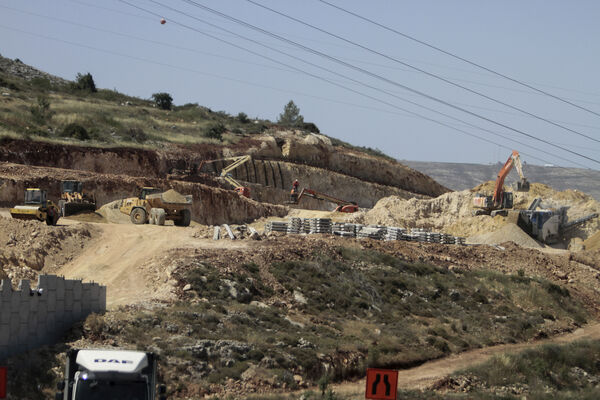Newsletter
Jun
14
2022
Welcome to the Tuesday News Bulletin! Jewish Currents is constantly getting quotes and scooplets from our network of sources, and every Tuesday, we release small stories exclusive to our newsletter subscribers in emails like this one. In addition to original reporting, the Tuesday News Bulletin serves as a forum for aggregating stories Jewish Currents staffers are tracking, with plenty of links to other publications so you can keep up with everything happening on our beats.
If you have more stories or tips, you can reach Isaac Scher at isaac@jewishcurrents.org.

Bulldozers are working to build a new settlement in the West Bank after Israeli Defense Minister Benny Gantz approved the unification of the council of two Jewish settlements for the first time in 24 years, Nablus, May 10th, 2022.
June 14th, 2022
(note: Senior Reporter Alex Kane is on parental leave; this is a guest post from Jewish Currents contributing writer Elisheva Goldberg)
Since 1967, successive Israeli governments—both right and left—have routinely passed a set of emergency regulations that enables the State of Israel to maintain a dual legal system in the West Bank. Under this system, Palestinians are subject to military law while Jews are subject to Israeli civil law, an arrangement that human rights organizations have consistently labelled “apartheid.” But on June 5th, the once-unthinkable happened: For the first time, the Knesset failed to renew the regulations.
Should these regulations expire, Israeli settlers would no longer enjoy the privileges of Israeli citizenship. Residents of Israeli settlements would immediately become subject to the same martial law as millions of West Bank Palestinians. They would lose access to public services like national insurance and education. Law enforcement would have to hand Israeli criminals over to military courts for trial. And Knesset members living beyond the Green Line would presumably be required to forfeit their offices: All MKs must also be residents of Israel. Settler leaders condemned the vote. “Without this law, it would be a disaster,” the governor of the Binyamin Regional Council, a grouping of settlements north of Jerusalem, told The Associated Press. “The Israeli government would lose any control here. No police, no taxes.”
The failed vote exacerbated an already roiling crisis in Israel’s coalition government, which contains a broad spectrum of ideologies—from nationalists to Islamists. The West Bank regulations have always had significant majority support in the Knesset, and this year is no exception. What is different now is that the staunchest pro-settler, expansionist parties—the Likud Party, the National Religious Party, the Kahanist Jewish Power Party—sit in the opposition, where they are laser-focused on bringing down the government. Led by former Prime Minister Benjamin Netanyahu, they voted against the regulations. So did some left-wing Arab coalition members, who defied the demands of coalition politics, voting against renewing the regulations or abstaining, often for personal political reasons. The right-wing elements of the coalition—specifically Justice Minister Gideon Sa’ar, who brought the regulations up for a vote—were thus left holding the bag.
On the other hand, many left-wing lawmakers—including those from the Labor and Meretz Parties—were willing to vote for the regulations in an attempt to keep the current broad-based, if flimsy, coalition afloat and to keep Netanyahu out of power for a bit longer. “What does it do for me to vote down these regulations?” Mossi Raz of the progressive Meretz Party asked. “Will it end the occupation? No. Will it end Apartheid? No. Will it help a single Palestinian? No.”
The current government will attempt to pass these regulations again before they expire at the end of the month. But their initial failure has, Wizard of Oz-style, pulled back the curtain on some of the inner workings of Israel’s 55-year-old military occupation. Raz sees a net positive in the fact that the continuation of the occupation is under discussion and scrutiny. “Finally,” he said, “Israelis know that settlers live outside the borders of Israel, that they live in occupied territory, that they live with two systems of law.”
Since last Monday, settlers in the West Bank have had to grapple with what it would be like to live under Israeli military rule. One settler campaign poster read: “[Prime Minister] Bennett, [Justice Minister] Sa’ar—resign! On your watch, residents of the West Bank will become second class citizens, and Israel will become an apartheid state!” Palestinians already live in such a state, but it is also true that many of the residents of the West Bank have lived in a kind of legal limbo for the last 55 years. Successive Israeli governments have lured hundreds of thousands of Israeli citizens to the territory, dangling economic incentives and promising them more space, an easy commute, and, critically, access to the benefits of their country of origin. While numerous legislative acts as well as decisions handed down by the High Court of Justice have cemented those rights, settlers have remained in a dubious legal position where, should Israel fail to pass certain regulations like the ones currently hanging in the balance, their lives could be profoundly upended.
For the right-wing opposition parties that helped vote down the regulations, injecting uncertainty into the lives of their constituents is a means to the end of bringing down the government. “They wanted to show that this government is unable to execute its basic functions with Arabs present—that it’s illegitimate,” said Assaf Goldfarb, the Director of the New Israel Fund’s Shatil Center for Policy Change. (Note: Goldfarb is my colleague at NIF, where I’m the director of media and policy.) Their hope is that failure to pass what is perceived as a “basic” security measure may prove fatal to a government that hangs by a thread.
Their bet may yet pay off. Nir Orbach of the Yamina Party, a right-wing coalition member, nearly came to blows with Arab coalition member Mazen Ghanayim of the United Arab List when Ghanayim voted “no.” He has begun talks with Netanyahu and the Likud about how he might join them in creating a new coalition of 61 Knesset members, even without fresh elections. Such a right-wing coalition would certainly pass these regulations, as would most any other political configuration in the Knesset. This leaves many of the left-wing coalition members scrambling to pass these regulations before June 30th. If they don’t, the right will get these regulations passed and then some: If another member of the coalition defects—as Yamina’s Idit Silman did in April—and votes with the opposition to dissolve the Knesset, it will usher in the fifth round of elections for Israelis in three years. Recent polling indicates that elections would yield a far-right coalition headed by Netanyahu, or, as Raz put it, “a Likud turned fully Kahane.” And even bringing down the coalition over the West Bank regulations wouldn’t prevent the dual legal system from continuing: Once new elections were called, the regulations would be automatically reinstated until six months after the establishment of a new government.
From the perspective of anti-occupation organizers, this moment is important, but it is not the one they are looking for. Eran Nissan, the Chief Operations Officer of Mehazkim, a progressive digital movement, believes that ending the occupation will require “coresistence by a political movement that is not only about ending the West Bank regulations, but about security and prosperity and justice for every inhabitant of this land.” The strategy to end it, he said, should not rest on “some expired regulation or some internal right-wing pissing match.”

On June 10th, Israelis and Jews from North America and Europe joined Palestinians in a mass demonstration near the Mitzpe Yair settlement in Masafar Yatta, West Bank. The demonstrators marched in opposition to the Israeli High Court’s recent decision to expel eight Palestinian communities from Masafer Yatta to create an exclusive military domain called “Firing Zone 918.” During the demonstration, Israeli settlers blockaded Palestinian roads and threw stones at protesters and their vehicles. Israeli forces used tear gas and stun grenades against protesters, two of whom they detained and later released.
As part of the Tuesday News Bulletin, Jewish Currents is publishing a photograph taken by members of Activestills every week, archiving ongoing dispossession and resistance from the river to the sea. You can find more information on this collaboration here.
-
The ice cream company Ben & Jerry’s, which announced last year that it would stop selling products in the occupied Palestinian territories, is requiring new hires to watch pre-recorded lectures on Israel/Palestine, Jewish Insider reported on Monday. The Israel/Palestine director of Human Rights Watch, Omar Shakir, leads one of them. A portion of a virtual lecture shows Shakir explaining Israel’s May 2021 assault (“it started over discriminatory efforts to force Palestinians out of their homes in occupied East Jerusalem”) and giving a brief account of Israel’s “written policy” of separating Palestinians in the West Bank from those in Gaza. In 2019, Israel deported Shakir from the region based on Israeli claims that he supported the Boycott, Divestment, Sanctions movement.
-
On Monday, The Washington Post published an investigation of the death of the Palestinian American reporter Shireen Abu Akleh, concluding that “an Israeli soldier . . . likely shot and killed” her. The investigation consisted of eyewitness accounts, audio-visual analysis, and on-the-ground inspections of the scene outside the Jenin refugee camp where Abu Akleh was killed on May 11th. Three weeks ago, CNN published an investigation using similar techniques, and came to a similar if more pointed conclusion: that Israeli forces killed Abu Akleh “in a targeted attack.” The Associated Press’s reporting concluded similarly as well. To date, no independent body is investigating the killing of Abu Akleh.
-
Iran has accused Israel of poisoning two Iranian scientists who have died in recent days, The New York Times reported on Monday. Separately, two experts in the aerospace division of Iran’s elite Revolutionary Guards died in recent days, Haaretz reported. One reportedly died in a car accident; the other during an unspecified “mission.” Israel has not officially claimed responsibility for any of the four most recent deaths. In the last several months, however, other deaths of Iranian scientists and military officers have been linked to Israel. The Times suggested that Israel could be pursuing a “shadow war” as Iran builds up its nuclear program.
-
Progressive congressional lawmakers are urging the Biden administration to exclude Israel from the US visa-waiver program, citing Israel’s “disparate treatment” of diaspora Palestinians who visit the West Bank. New Israeli border policies, which have not yet taken effect, would pre-screen Palestinian visitors to the occupied territory, allowing their entrance only if they prove a “first-degree” familial connection. Successful applicants will have to provide, among other things, the names of their relatives and their IDs, which critics describe as aiding Israel’s surveillance of Palestinians. The visa-waiver program would benefit Israeli travel to the US. The lawmakers, including Reps. Alexandria Ocasio-Cortez and Rashida Tlaib, wrote in a letter to the Biden administration that “Israel’s inclusion in the program would represent an endorsement of travel discrimination.”
-
On Friday, Israeli settlers attacked demonstrators in the West Bank who were protesting the ongoing forced displacement of Palestinian residents of Masafer Yatta. +972 Magazine reported that settlers threw rocks at activists, breaking a car window as a pair of demonstrators tried to drive away. Israeli soldiers on the scene reportedly did not intervene against the settlers. One settler told a Palestinian demonstrator, “We will slaughter you and your collaborators.” In early May, the Israeli government approved a plan to make the villages of Masafer Yatta into a “firing zone,” or an exclusive domain of the Israeli military, after a decades-long court case. Progressive US lawmakers recently called on the Biden administration to stop the destruction of the villages, calling it a “war crime.”